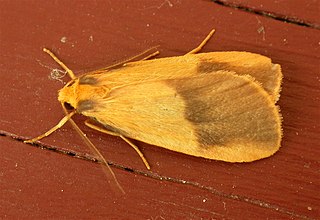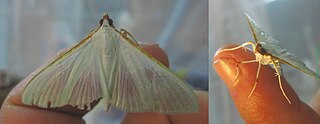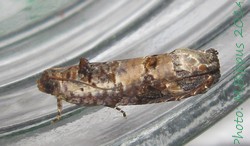Related Research Articles

Threnosia heminephes, the halved footman, is a moth of the subfamily Arctiinae first described by Edward Meyrick in 1886. It is found in Australia, where it has been recorded from the Australian Capital Territory, New South Wales and Victoria.

Leuroperna sera is a moth of the family Plutellidae first described by Edward Meyrick in 1885. It is found in Japan, Taiwan, Vietnam, Indonesia, India, Sri Lanka, Australia, and New Zealand.

Dracaenura is a genus of moths of the family Crambidae. It was described by Edward Meyrick in 18863.
Malaciotis is a monotypic moth genus of the family Crambidae described by Edward Meyrick in 1934. It contains only one species, Malaciotis thiogramma, described by the same author in the same year, which is found in Katanga Province of the Democratic Republic of the Congo.

Notarcha is a genus of moths of the family Crambidae described by Edward Meyrick in 1884.
Piletocera is a genus of moths of the family Crambidae. The genus was first described by Julius Lederer in 1863.

Stemorrhages is a genus of moths of the family Crambidae described by Julius Lederer in 1863. Members of the moth genus Palpita may be very similar.

The Depressariinae – sometimes spelled "Depressiinae" in error – are a subfamily of moths in the superfamily Gelechioidea. Like their relatives therein, their exact relationships are not yet very well resolved. It has been considered part of family Elachistidae sensu lato or included in an expanded Oecophoridae. In modern classifications they are treated as the distinct gelechioid family Depressariidae.

Dudua aprobola, the mango flower webworm or litchi leaf roller, is a moth of the family Tortricidae. The species was first described by Edward Meyrick in 1886. It is a pest on several economically important crops.

Anestia ombrophanes, the clouded footman, is a moth of the subfamily Arctiinae. The species was first described by Edward Meyrick in 1886. It is known from the Australian Capital Territory, New South Wales, Queensland, Western Australia and Victoria.
Gymnoscelis erymna is a moth in the family Geometridae. It was described by Edward Meyrick in 1886. It is found on Tonga and Fiji, as well as in Australia.
Damias procrena, the procrena footman, is a moth of the family Erebidae. The species was first described by Edward Meyrick in 1886. It is found in the Australian states of Victoria and Tasmania.
Scaptesyle dichotoma, the reticulated footman, is a moth in the subfamily Arctiinae. It was described by Edward Meyrick in 1886. It is found in Australia, where it has been recorded from Queensland, New South Wales, and Victoria.
Thallarcha chrysochoa, the golden footman, is a moth in the subfamily Arctiinae. It was described by Edward Meyrick in 1886. It is found in Australia, where it has been recorded from the Australian Capital Territory, New South Wales and Victoria.
Thallarcha phalarota, the adorned footman, is a moth in the subfamily Arctiinae. It was described by Edward Meyrick in 1886. It is found in Australia, where it has been recorded from the Australian Capital Territory, New South Wales, Queensland and Victoria.
Macrobathra mesopora is a moth in the family Cosmopterigidae. It was described by Edward Meyrick in 1886. The adult moths have off-white forewings with bold dark brown bands and patches. The hindwings are dark brown. The wingspan is about 1.5 cm. It is found in Australia, where it has been recorded from New South Wales.

Nacoleia octasema, the banana scab moth, is a moth in the family Crambidae. It was described by Edward Meyrick in 1886. It is found on Vanuatu and in Indonesia, New Guinea, the Solomon Islands, New Caledonia, Fiji, Tonga, Samoa and Australia, where it has been recorded from Queensland.
Garrha atoecha is a moth in the family Oecophoridae. It was described by Edward Meyrick in 1886. It is found in Australia, where it has been recorded from New South Wales and Queensland.
Atasthalistis pyrocosma is a moth in the family Gelechiidae. It was described by Edward Meyrick in 1886. It is found on New Guinea and Australia, where it has been recorded from Queensland.
Stathmopoda masinissa, the persimmon fruit moth, is a moth of the family Stathmopodidae. The species was first described by Edward Meyrick in 1906. It is a serious pest on several persimmon species. It is found in several Old World countries Japan, Korea, Australia, Sri Lanka, Thailand and China.
References
- ↑ Nuss, M.; et al. (2003–2017). "GlobIZ search". Global Information System on Pyraloidea. Retrieved May 29, 2018.
- ↑ Pitkin, Brian; Jenkins, Paul (November 5, 2004). "Macaretaera Meyrick, 1886". Butterflies and Moths of the World. Natural History Museum, London. Retrieved May 29, 2018.
- ↑ CSIRO Ecosystem Sciences - Australian Moths Online
- ↑ BOLD Systems
| This Spilomelinae-related article is a stub. You can help Wikipedia by expanding it. |